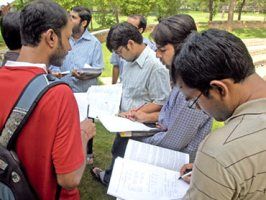 Budget provisions
Budget provisions
-
To launch a national multi-skill programme called Skill India, which will provide training in traditional professions like welding and carpentry etc.
-
Allocated amount of Rs 28635 crore for Sarva Shiksha Abhiyan and Rs 4966 crore for Rashtriya Madhyamik Shiksha Abhiyan. A School Assessment Programme is being initiated at a cost of Rs 30 crore. Additionally, the Pandit Madam Mohan Malviya New Teachers Training Programme is being launched for an initial sum of Rs 500 crore.
-
A National Rural Internet and Technology Mission for services in villages and schools, training in IT skills and E-Kranti for government service delivery and governance scheme is also proposed at a cost of Rs 500 crore.
-
Allocated a sum of Rs 100 crore for setting up virtual classrooms as Communication Linked Interface for Cultivating Knowledge (CLICK) and online courses.
-
Allocated Rs 500 for setting up 5 more IITs in the Jammu, Chhattisgarh, Goa, Andhra Pradesh and Kerala.
-
5 IIMs to come in the States of HP, Punjab, Bihar, Odisha and Rajasthan.
-
Simplification of norms to facilitate education loans for higher studies.
-
At present, all services provided by educational institutions [providing educational services specified in the negative list] to their students, faculty and staff does not attract service tax and this will continue.
-
Proposed to omit the concept of ‘auxiliary educational services’ and specify in the notification, the services which will be exempt when received by the educational institutions.
-
In respect of services received by an eligible educational institution: (i) transportation of students, faculty and staff; (ii) catering service including any mid-day meals scheme sponsored by the Government; (iii) security or cleaning or house-keeping services in such educational institutions; and (iv) services relating to admission to such institution or conduct of examination, are being exempted from service tax.
-
Exemption extended so far in respect of renting of immovable property service received by educational institutions, stands withdrawn.
Industry Expectation
-
Currently, government is allowing technical institutions to be set up through Section 25 Companies and now proposes foreign educational institutions to be included. It is requested that all types of Indian institutions be allowed to be established as Section 25 companies and permission may be granted to convert the existing trusts and societies to Section 25 companies.
-
Expects National Higher Education Finance Corporation to provide loans at concessional rates of interest to agencies for establishment of institutions in educationally backward areas.
-
Tax relief to the tune of 50% should be provided to Universities / Higher Education Institutes which spend on the capacity development and training of their staff.
-
Allocate grants/funds to Universities/organizations/ industry associations focusing on faculty development programmes.
-
Expects a National Learning Corporation should to set up which would be responsible for eLearning standards, content repositories (such as the ones under NMEICT), research into pedagogy and technology, teacher training in the use of ICT/EdTech and technology provision for learning and learning content management, ePortfolios, MOOCs and a host of other platforms. The NLC could be a public -- private entity that will help drive India to the forefront of digital learning and innovation
-
Any person enrolling for a Skills Certification course be eligible for a 20% tax rebate (only applicable for the tuition fee amount).
-
Any Educational Service Provider opening a Skills Centre in a backward area should be given an incentive like exemption from income tax for a period of 5 years.
-
All donations (and not just restricted only to research funding) to qualified Higher Education institutions should be eligible for 200% tax deduction
-
Institutions and corporate investing in research leading to an award of patent should be eligible for higher research grants from Government of India
-
New or existing educational institutions making a fresh investment of Rs 75 crore or above should be eligible for a preferred and long term Loan facility with interest rates at par with Base Rates or Prime Lending Rates of the commercial banks or financial institutions and for a tenure of up to 15 years with step up repayment plan
-
Higher Education institutions should be free to set up campuses overseas freely and a line of credit of at least $ 500 m should be set up by the Exim Bank, as a part of India's diplomatic efforts and use of soft power.
-
Tax break to corporates which nominate their employees for higher education either through the continuing education model or a full time program. The fees paid by corporate for employees' education should qualify for investment in human resources and hence exempted for tax purposes.
-
As college fees have increased tremendously, Income Tax payers should be allowed a deduction against gross total income upto a minimum of Rs 1,00,000 per child for fees paid to a Higher Education institution recognized by Government.
-
Earmark funds for Farmers Linked Commercial Projects with market linkage established by Universities.
Thruston education by allocating amount of Rs 28635crore for Sarva Shiksha Abhiyan and Rs 4966 crore for RashtriyaMadhyamik Shiksha Abhiyan goes well for education sector and Education companies like Educomp, Everonn and NIIT. Everonn Education will be benefit from allotment of fund to Skill India Programme which is formed to motivate youth to voluntarily join skill development programmes. Also, emphasis on virtual class room and ITin villages gives a big opportunities to companies like NIIT.
Stock to watch
Educomp,Everonn, NIIT
Outlook
Education remains one of the key focuses of the new government also. India is faced with a unique opportunity -- highest increase in workingage (15-64) population over the next 20-30 years which can propel economic growth. India will account for 25% of the global increase in workforce over the next 4 decades.
The government is focused on improving the literacy rate and the quality of education in the country along with focus on skill development.
Digitization and adoption of information and communication technology is modernizing the traditional way of classroom learning.
These trends present a huge opportunity for private and foreign sector players looking to provide quality education and services in this sector. Budget was positive for the sector.
Please click here for the Complete Coverage of Budget 2014 -15












 © 2025
© 2025